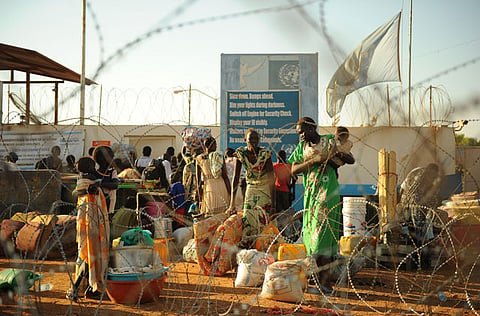World leaders call for end to hostilities in South Sudan
The oil-rich nation is spiralling into a civil war

Manila: UN Secretary-General Ban Ki-moon on Sunday demanded an immediate end to violence in South Sudan, warning that tens of thousands remained vulnerable.
“I demand that all political, military and militia leaders stop hostilities and end the violence against the civilians,” Ban told a news briefing in Manila as he wrapped up a two-day visit to the Philippines.
He called on South Sudan President Salva Kiir and his rival, sacked vice-president Riek Machar to “find a political way out of this crisis” and order their followers to lay down arms.
“I call on them to do everything in their power to ensure that their followers hear their message loud and clear,” Ban said.
“Continued violence, ethnic or otherwise, is completely unacceptable and poses a dangerous threat to the future of their young country,” the UN chief said.
Six days of fighting between followers of both sides have left at least 500 dead in the capital of the small, but oil-rich African nation, which gained independence from Sudan in 2011.
Kiir has accused Machar of trying to mount a coup, which the latter denies. Machar in turn has accused the president of carrying out a bloody purge.
Tens of thousands have already been displaced, and Ban said up to 40,000 people have sought refuge in UN camps across the country, which appeared to be on the brink of civil war.
In the latest hostilities, four US servicemen were wounded in an attack on their aircraft as it was on its way to evacuate Americans from the rebel-held town of Bor.
Two UN peacekeepers were also killed on Thursday after rebel forces attacked a UN camp where civilians had taken refuge.
Earlier, US President Barack Obama warned against a coup attempt, in a statement that came after four US servicemen were wounded when the aircraft they were flying in came under fire on their way to help evacuate American citizens from the country.
“Any effort to seize power through the use of military force will result in the end of longstanding support from the United States and the international community,” the White House said Saturday.
Obama stressed that South Sudanese leaders “have a responsibility to support our efforts to secure American personnel and citizens in Juba and Bor”, the capital and a rebel-held flashpoint town.
The attack underlined the increasingly dangerous situation in South Sudan, where at least one UN base has also come under attack in recent days - with the deaths of two Indian peacekeepers and possibly dozens of civilians.
The US, Britain, Kenya and Uganda have been evacuating their nationals.
South Sudan, the world’s newest country, split from Sudan in 2011 after a two-decade civil war that left two million people dead. But it has never been able to heal its own ethnic rivalries.
The fighting has both ethnic and political dimensions, as troops loyal to Kiir, an ethnic Dinka, battle forces backing Machar, a Nuer.
At least 500 people have been killed in Juba alone in a week of fighting.
Tens of thousands of South Sudanese have fled their homes, many seeking shelter at UN bases amid warnings the impoverished nation was on the brink of all-out civil war.
“I am afraid. I just can’t imagine being forced to become refugees again,” said Susan Nakiden, a South Sudanese woman among the thousands sheltering at a UN base in Juba. The mother of three said she had already been forced to flee her home during the Sudanese civil war.
Politics versus ethnicity
A descent into civil war in South Sudan would have serious local and regional consequences.
“In the coming days, refugees are likely to reach Uganda, Kenya and Ethiopia,” said Casie Copeland of the International Crisis Group.
“South Sudan has become a critical player in the broader East African economy, with substantial regional and international investment,” Copeland added. Many groups have called for greater international involvement. “The international community needs to double down on diplomatic engagement to facilitate a political resolution to the crisis,” said Akshaya Kumar, Sudan and South Sudan policy analyst with the Enough Project.
Like many conflicts in this tenuous nation, the fighting has taken on an ethnic dimension, human rights workers say. Machar, the former vice president removed over the summer when Kiir summarily dismissed his entire cabinet, is a Nuer. The president, by contrast, belongs to the majority Dinka ethnic group.
In the capital, South Sudanese forces have targeted members of the ethnic Nuer group, killing many and detaining others, including soldiers, lawmakers and students, rights workers and refuge seekers say.
“We are deeply concerned that ethnically based attacks on all sides will lead to revenge attacks and more violence,” Daniel Bekele, Africa director of Human Rights Watch.
Other observers have said that politics, not ethnicity, are driving the conflict.
“It is a power struggle,” said Zacharia Diing Akol, an analyst with The Sudd Institute in Juba. “Ethnicity is an afterthought.”
But not everyone if fleeing.
In a land that has suffered for so long from war, some refuse to think that things could get worse.
“I’m shopping for Christmas,” said Taban John, proudly showing his gift purchases — a shirt, two pairs of trousers and a belt.
“Of course I’m concerned, but the fighting won’t stop me from enjoying Christmas,” he added.
“I am not going to leave Juba... when it comes to Christmas, it is the time when as a human being you know you just have to carry on.”
Sign up for the Daily Briefing
Get the latest news and updates straight to your inbox



